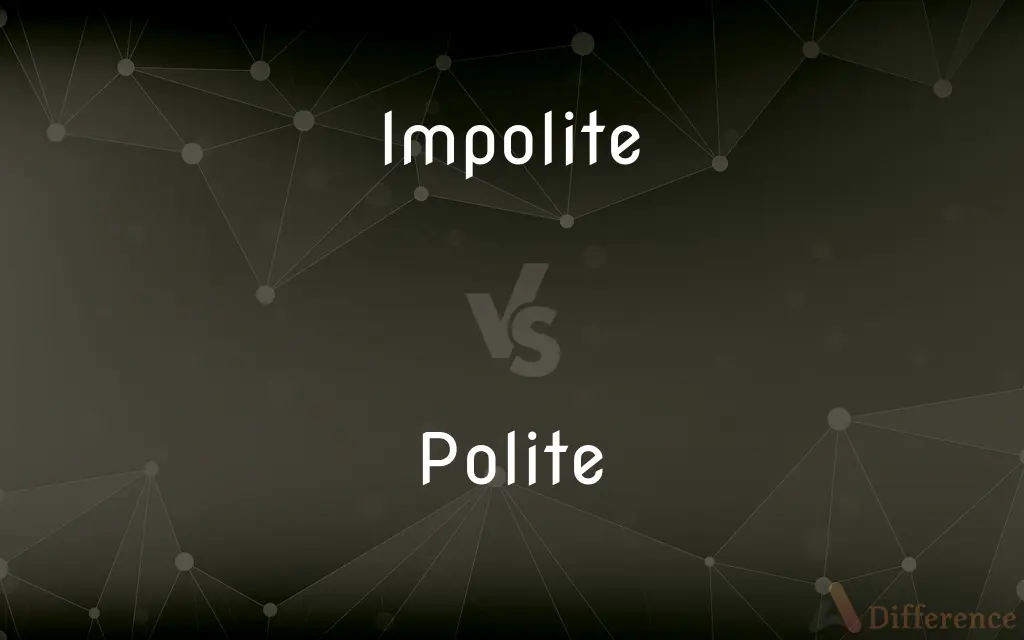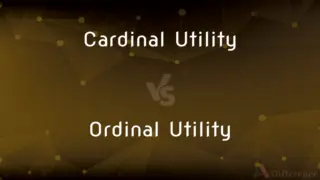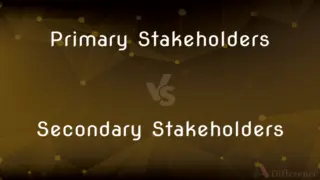Impolite vs. Polite — What's the Difference?
By Tayyaba Rehman — Published on October 11, 2023
Impolite refers to showing rude or discourteous behavior, while Polite means showing good manners and consideration toward others.

Difference Between Impolite and Polite
Table of Contents
ADVERTISEMENT
Key Differences
Impolite is a descriptor for actions, words, or behaviors that lack consideration for others and may cause offense. Polite, on the other hand, characterizes actions and words that show respect and thoughtfulness toward others, reflecting an understanding of social etiquette.
In many cultures, being impolite is often frowned upon, as it can disrupt harmony in interpersonal relationships. Polite behaviors, conversely, are appreciated and often expected in social interactions to maintain cordiality and mutual respect.
While impolite behaviors might stem from ignorance, carelessness, or intentional rudeness, polite actions often suggest an individual's awareness of their surroundings and a conscious effort to be kind and gracious.
It's essential to understand that what's considered impolite in one culture might be perfectly acceptable in another. Similarly, polite gestures in one society might not have the same resonance in another, underscoring the cultural relativity of manners.
It's not merely the action itself but the intention behind it that often defines its nature. While someone might unintentionally come across as impolite, their intent might be benign. Conversely, a polite gesture might be employed manipulatively, proving that context and intent play pivotal roles in perception.
ADVERTISEMENT
Comparison Chart
Nature of Behavior
Rude or discourteous.
Respectful and considerate.
Impact on Others
Can cause offense or discomfort.
Promotes harmony and cordiality.
Source
Often from ignorance, carelessness, or intention.
Reflects understanding of etiquette and awareness.
Cultural Relativity
Varies across cultures.
Varies across cultures.
Underlying Intent
Not always intentionally harmful.
Can be genuine or manipulative.
Compare with Definitions
Impolite
Lacking good manners.
It's impolite to interrupt someone while they're speaking.
Polite
Behaving in a considerate and courteous manner.
It's polite to say please and thank you.
Impolite
Without consideration for others.
It's impolite to keep checking your phone during dinner.
Polite
Conforming to social etiquette.
It's polite to RSVP to an invitation in a timely manner.
Impolite
Not conforming to societal norms of respect.
It's impolite to raise your voice in a library.
Polite
Reflecting kindness and consideration in interactions.
Even when he disagreed, he remained polite in the discussion.
Impolite
Acting in a way that can upset or offend.
It's impolite to mock someone's accent.
Polite
Acting in ways that make others feel comfortable.
It's polite to greet someone when you enter a room.
Impolite
Showing rudeness or discourtesy.
His comments were impolite and offensive.
Polite
Marked by or showing consideration for others and observance of accepted social usage.
Impolite
Not polite; discourteous.
Polite
Refined; elegant
Polite society.
Impolite
Not polite; not of polished manners; wanting in good manners.
Polite
Well-mannered, civilized.
It's not polite to use a mobile phone in a restaurant.
Impolite
Not polite; not of polished manners; wanting in good manners; discourteous; uncivil; rude.
Polite
(obsolete) Smooth, polished, burnished.
Impolite
Not polite
Polite
To polish; to refine; to render polite.
Polite
Smooth; polished.
Rays of light falling on a polite surface.
Polite
Smooth and refined in behavior or manners; well bred; courteous; complaisant; obliging; civil.
He marries, bows at court, and grows polite.
Polite
Characterized by refinement, or a high degree of finish; as, polite literature.
Polite
To polish; to refine; to render polite.
Polite
Showing regard for others in manners, speech, behavior, etc.
Polite
Marked by refinement in taste and manners;
Cultivated speech
Cultured Bostonians
Cultured tastes
A genteel old lady
Polite society
Polite
Not rude; marked by satisfactory (or especially minimal) adherence to social usages and sufficient but not noteworthy consideration for others;
Even if he didn't like them he should have been civil
Polite
Showing good manners and respect.
He was always polite, holding the door open for others.
Common Curiosities
How is "polite" different from "impolite"?
Polite denotes courteous and respectful behavior, while impolite indicates the opposite.
What does "impolite" mean?
Impolite refers to actions or behaviors that are considered rude or lacking in manners.
Can someone be "impolite" without realizing it?
Yes, sometimes individuals may unknowingly behave in ways considered impolite due to cultural differences or lack of awareness.
Why is being "polite" important?
Being polite promotes harmony, mutual respect, and positive interactions in society.
Is being "impolite" always intentional?
No, impolite actions can stem from ignorance or carelessness, not just intent.
Can politeness be feigned?
Yes, individuals can act politely without genuine feelings, often for social or strategic reasons.
Can being too "polite" be detrimental?
Over-politeness can sometimes come off as insincere or prevent open communication.
Is it "polite" to always agree with others?
Not necessarily. One can disagree politely without being rude or confrontational.
Are children naturally "impolite"?
No, but they may need guidance to understand social norms and etiquettes fully.
Can "impolite" actions ever be justified?
Context matters. In certain situations, actions deemed impolite might be warranted, though they should be approached with caution.
Are "polite" behaviors the same in all cultures?
No, what's considered polite varies across cultures and societies.
How can one improve their "polite" behaviors?
Awareness, empathy, understanding cultural norms, and practicing active listening can enhance polite behaviors.
Is there a universal standard for what's "polite" and "impolite"?
No, standards of politeness are culturally relative and can vary widely across different societies.
Does being "polite" mean avoiding confrontation?
Not always. It's possible to address issues and confrontations in a polite and constructive manner.
Why might someone intentionally be "impolite"?
Reasons could include seeking attention, expressing displeasure, or challenging societal norms.
Share Your Discovery

Previous Comparison
Cardinal Utility vs. Ordinal Utility
Next Comparison
Primary Stakeholders vs. Secondary StakeholdersAuthor Spotlight
Written by
Tayyaba RehmanTayyaba Rehman is a distinguished writer, currently serving as a primary contributor to askdifference.com. As a researcher in semantics and etymology, Tayyaba's passion for the complexity of languages and their distinctions has found a perfect home on the platform. Tayyaba delves into the intricacies of language, distinguishing between commonly confused words and phrases, thereby providing clarity for readers worldwide.















































